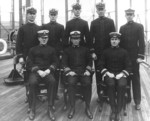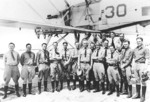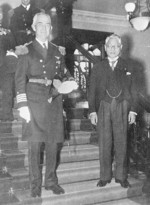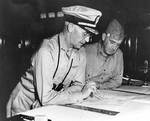Richmond Turner
| Surname | Turner |
| Given Name | Richmond |
| Born | 27 May 1885 |
| Died | 12 Feb 1961 |
| Country | United States |
| Category | Military-Sea |
| Gender | Male |
Contributor: C. Peter Chen
ww2dbaseRichmond Kelly Turner was born in Portland, Oregon, United States to farmer-rancher and printer Enoch Turner and Laura Francis Turner (née Kelly). He grew up largely in Stockton, California, United States, graduating from Stockton High School in 1904. On 5 Jun 1908, he graduated from the United States Naval Academy at Annapolis, Maryland, United States. In 1910, he married Harriet "Hattie" Sterling in Stockton. In 1913, he briefly held command of destroyer USS Stewart at the rank of lieutenant junior grade. Subsequently, he served aboard gunboat USS Marietta, battleship USS Pennsylvania, battleship USS Michigan, and battleship USS Mississippi until 1919. Between 1919 and 1922, at the rank of lieutenant commander, he served as an ordnance officer at the Naval Gun Factory in Washington DC, United States. Going back to sea duty, he served as the gunnery officer of battleship USS California and then became the fleet gunnery officer of Commander Scouting Fleet. In the mid-1920s, he also received command of destroyer USS Mervine. In 1925, he was promoted to the rank of commander. Between 1925 and 1927, he served with the Bureau of Ordnance at the Navy Department in Washington DC. In 1927, he received flight training and became a naval aviator at Pensacola, Florida, United States. In 1928, he was named the commanding officer of seaplane tender USS Jason. Shortly after, he became the commander of Aircraft Squadrons of the Asiatic Fleet. Between 1933 and 1934, he served as the executive officer of carrier USS Saratoga. Between 1935 and 1938, after attending the Naval War College as a student, he remained in the institution as a faculty member. In 1939, as the commanding officer of heavy cruiser USS Astoria, he visited Japan for about 10 days; this trip, however short, gave him the notion that he had an exposure to the Japanese mindset. Between 1940 and 1941, he was the director of the War Plans Division of the Navy Department in Washington DC. In 1941, he was promoted to the rank of rear admiral.
ww2dbaseIn the days leading up to the Pearl Harbor raid in the US Territory of Hawaii, Turner, who meddled in naval intelligence, was blamed by some for the failure of passing certain pieces of intelligence he deemed as less-important to Pacific Fleet commander Husband Kimmel. Before the end of Dec 1941, he was made the Assistant Chief of Staff to the Commander-in-Chief of the United States Fleet Ernest King. In his new capacity, he continued to meddle in intelligence affairs, frustrating the efforts of other intelligence officers; while Joseph Rochefort's team had determined with good confidence that the Japanese were looking to attack Midway Atoll and Aleutian Islands, for example, Turner would argue that the Midway attack was only a diversion for the real offensive against either northwestern Australia or New Caledonia. Very shortly before the Midway attack, possibly due to US Army General George Marshall's suggestion as Turner was known to be a difficult officer to work with, he was removed from his position in the Navy Department and was given sea duty in command of the Amphibious Force, South Pacific Force. King reportedly later joked that this suggestion was the US Army's greatest contribution to the Pacific War, as Turner would turn out to be a brilliant commander, taking part in the planning of many of the major amphibious assaults in the Pacific War. In the final stages of the war, he was named the commander of the amphibious operations against the Japanese home islands, although such an operation would never take place.
ww2dbaseAfter the war, Turner served on the Navy Department's General Board and then was made a member of the United Nations Military Staff Committee as a representative of the US Navy. He retired from military service in Jul 1947. He passed away in Monterey, California, United States in 1961 and was buried in Golden Gate National Cemetery in San Bruno, California.
ww2dbaseSources:
Elliot Carlson, Joe Rochefort's War
Dan van der Vat, The Pacific Campaign
United States Navy Naval History and Heritage Command
Wikipedia
Last Major Revision: Aug 2012
Richmond Turner Interactive Map
Photographs
 |  |  |  |
Richmond Turner Timeline
| 27 May 1885 | Richmond Turner was born in Portland, Oregon, United States. |
| 5 Jun 1908 | Richmond Turner graduated from the United States Naval Academy at Annapolis, Maryland, United States. |
| 3 Aug 1910 | Richmond Turner married Harriet Sterling in Stockton, California, United States. |
| 16 Jul 1942 | US Navy Vice Admiral Robert Ghormley named Rear Admiral Richmond Turner the commanding officer of the Amphibious Force for the upcoming operations in the Solomon Islands. |
| 18 Jul 1942 | US Navy Rear Admiral Richmond Turner took command of the Amphibious Forces South Pacific at Wellington, New Zealand. |
| 7 Feb 1943 | Admiral William Halsey named Rear Admiral Richmond Turner the overall commander of the Russell Islands operation. |
| 3 Jun 1943 | The US South Pacific command published Operation Plan 14-43 for the capture of Japanese-held islands in the central Solomon Islands. US Navy Rear Admiral Richmond Turner was named the overall commanding officer, and the largest contingent under his command would be the US Army 43rd Division. |
| 14 Jul 1943 | Rear Admiral Theodore S. Wilkinson relieved Rear Admiral Richmond R. Turner as the commanding officer of the III Amphibious Force. |
| 12 Feb 1961 | Richmond Turner passed away in Monterey, California, United States. |
Did you enjoy this article or find this article helpful? If so, please consider supporting us on Patreon. Even $1 per month will go a long way! Thank you. Share this article with your friends: Stay updated with WW2DB: |
Visitor Submitted Comments
22 Mar 2017 09:27:30 AM
what were some of his biases and or weaknesses in the war?
All visitor submitted comments are opinions of those making the submissions and do not reflect views of WW2DB.
» Guadalcanal Campaign
» Solomon Islands Campaign
» Marshall Islands Campaign
» Okinawa Campaign
Ship(s) Served:
» Astoria (New Orleans-class)
» California
» Mississippi
» Pennsylvania
» Saratoga
- » 1,150 biographies
- » 337 events
- » 43,917 timeline entries
- » 1,241 ships
- » 350 aircraft models
- » 207 vehicle models
- » 374 weapon models
- » 123 historical documents
- » 260 facilities
- » 470 book reviews
- » 28,540 photos
- » 432 maps
George Patton, 31 May 1944
Please consider supporting us on Patreon. Even $1 a month will go a long way. Thank you!
Or, please support us by purchasing some WW2DB merchandise at TeeSpring, Thank you!
18 Nov 2014 08:32:26 PM
Bio written by his enemy. Leaves out his three years of top accomplishment 1942-45 leading many successful invasions, being the inventor and master of Pacific amphibious warfare, like Guadalcanal, Saipan and Okinawa.
He did not just plan these operations, he was the admiral in charge of them. That included being the "fighting admiral" who was so close to Japanese forces that his ship was fired upon many times and sunk once.